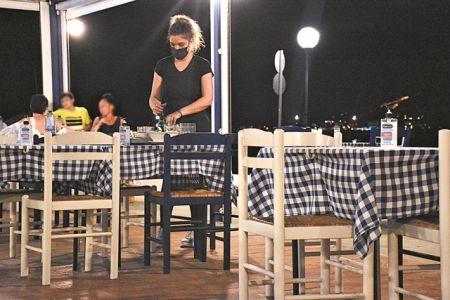
Intense ups and downs, increased delivery but also a change in the way we enjoy going out to eat are the elements that characterized the food service sector this past year. First of all, let’s talk about… minus 4 months – from November 2020 to May 2021 the stores were closed. The period July – October was admittedly very good, this was confirmed by those who spoke. From the fall, however, the decline began again.
According to a recent survey conducted by ICAP on behalf of the Athens Chamber of Commerce, turnover losses in very small restaurants (with 1-9 employees) in Attica in 2020 were about 600 million, while in 2021 it is estimated that they will reach 76, 2 million.
The president of the Panhellenic Federation of Restaurant and Related Professions (POESE), George Kavathas, told us that between July 15 and mid-October the industry at a rate of 60% went well. However, the measures with the obligation of testing for the entry of unvaccinated people indoors first and then in open ones (but maybe not only those) brought a drop in the turnover. Specifically, Mr. Kavathas estimates that on average the reduction of turnover in the period November – December 2021 will reach 50%. “On the other hand,” he noted, “we have to deal with the big problem of price increases and raw materials and energy. The situation seems difficult. “Surveys speak of a percentage of about 44% that indicates fear and uncertainty about the future survival of their business.”
“We live from what we make over the weekend” were typically told by employees in the area that are active in the center of Athens. There are days – mostly weekdays – when some restaurants or taverns count the servings on the fingers of one hand. The financial assistance from the state last year was characterized by all as positive and satisfactory. Assistance expressed both as repayable and as a suspension of insurance debts or emergency benefits (although a shopkeeper told us that he never received it, nor does he know anyone who received the 7% subsidy of the 2019 turnover that was to be given for the restart of the restaurant in May of 2021).
“While we had huge dynamics in 2019, 2021 was like starting from the beginning (I do not count in 2020 at all). In 2019 I closed with a staff of 14 people and now I work with 5. I changed the schedule, we no longer work at noon. I estimate that my turnover in 2021 is around 50% that of 2019. The help of the state was great, but it is a fact that shops that did not have debts are now in debt,” a shopkeeper in the center of Athens told us. 
Increase in delivery
Delivery helped many stores survive – especially at the beginning of the year. The pandemic found one of the two stores of Mr. Antonis Ioakeimidis in its beginning. In both, however, one Italian and the other serving roast meet, he developed the delivery from the beginning of the lockdowns – both on their own and with delivery platforms. So he created a solid customer base.
A parenthesis: The rise in delivery dining is also confirmed by the data of the industry. In 2020, while the restaurant was closed for 5 months and had a decrease of 38%, 34% stated an increase in turnover compared to 2019.
The traffic in the two stores of Mr. Ioakeimidis from July until October 2021, as he tells us, was very good. In fact, the one that has been operating for years, and has a measure of comparison, had a movement of 10% over 2019, before the coronavirus. He estimates that one reason is the increase in tourism (both are in Koukaki), but also the fact that Greek customers were very stressed after the second quarantine and wanted to leave.
Vaccinated and unvaccinated customers, however, as he told us, prefer the outdoors, so they feel safer. Since November, when the weather deteriorated, there has been a decrease in customer traffic (which, due to the fact that it operates in a tourist area, is considered normal), but also an increase in delivery again.
Habits change
Both he and the other shopkeepers we spoke to referred to two new features of customer habits. First, that we now go out to eat but our time spent in restaurants and taverns has been greatly reduced.
“A coffee at most after the meal and they leave. Where are the seasons when the customer stayed 4 and 5 hours drinking and snacking,” they told us. Of course, this also helps the shopkeepers, as the chairs have been reduced, the tables have been thinned, and they need to work with more “shifts”, with more “fillings” to survive. The second feature is that especially older people prefer to leave earlier and return home earlier.
Customers control processes and consequences
Mr. Spyros Liakos and I met in one of his stores in Peristeri. Although it was early Thursday afternoon, the restaurant was full. “We happened to be hit by the storm (the financial crisis and the pandemic now) with a large pool of customers, fanatics I could say. If this tank was smaller, we probably would have a problem too. But now, all our stores operate as if there is no crisis,” he commented. However, he referred to a problem that he fears will have an impact in the future. He talks about the checks on customers they are required to do.
“It is a problem because in the restaurant, and especially in those that have high level dining, the guest, the customer, does not go because he is hungry, he goes to enjoy himself. In other words, he is looking for a relationship that will fascinate him and will not disappoint him. I believe that in the future the stores that will open after the coronavirus will have a comparative advantage over those that have undergone this process. Clearly, then, our work has become more complicated because we are called to cover any customer frustrations from delays but also to rack our brains to find solutions; no table has contact with the other, we put partitions, etc. All of these are additional headaches to the headache that the restaurant routine has anyway.”
Latest News

DM Dendias: We talk With Turkey But We Always Bring Up Their Unacceptable Positions
Second and last day of closely watched conference, entitled 'Metapolitefsi 1974-2024: 50 Years of Greek Foreign Policy', also included appearances by PM Mitsotakis, Ex-PM Tsipras and PASOK leader Nikos Androulakis, among others

Rhodes Airport Tops Fraport Greece’s Regional Airports in 2024 Performance
According to Fraport's data, more than 35 million passengers (specifically 35.2 million) were handled by Fraport-managed airports during the 11 months.

European Central Bank Cuts Interest Rates by 25 Basis Points
It is the fourth cut of interest rates by Europe’s central bank, a move expected by the markets and financial analysts leading to the rate settling at 3%.

Airbnb: New Measures Add €600 in Extra Costs for Property Owners
Property managers face an immediate administrative fine of 5,000 euros if access to the inspected property is denied or any of the specified requirements are not met.

Economist: Greece Included in the Best Performing Economies in 2024
Meanwhile, Northern European countries disappoint, with sluggish performances from the United Kingdom and Germany.

EasyJet Expands Its Routes from Athens
The airline’s two new routes will be to London Luton and Alicante and they will commence in summer 2025.

Capital Link Forum Highlights Greece’s Economic Resurgence; Honors BoG Gov Stournaras
Capital Link Hellenic Leadership Award recipient, Bank of Greece Gov. Yannis Stournaras, an ex-FinMin, was lauded for his pivotal role during Greece’s economic recovery

Tourist Spending in Greece Up by 14%, Visa Card Analysis Shows
Greece’s capital Athens emerged as the most popular destination, recording a 17% increase in transactions with Visa cards, surpassing even the cosmopolitan island of Mykonos.

Inflation in Greece Unchanged at 2.4% in Nov. 2024
The general consumer price index (CPI) posted a 0.4% decrease in November compared to the previous month

2024 Christmas Holidays: Extended Shop Hours Schedule
The 2024 Christmas Holidays extended shop hours schedule commences on Thursday, December 12 and runs until the end of the year.


![Φυσικό αέριο: Δυναμικό come back του LNG στην Ελλάδα [γραφήματα]](https://www.ot.gr/wp-content/uploads/2023/01/OT_naturalgas-90x90.jpeg)












![Fraport: Πάνω από 35 εκατ. επιβάτες στα αεροδρόμια το 11μηνο – Πτώση στη Μύκονο [πίνακας]](https://www.ot.gr/wp-content/uploads/2022/06/fraport-90x90.jpg)


























 Αριθμός Πιστοποίησης Μ.Η.Τ.232433
Αριθμός Πιστοποίησης Μ.Η.Τ.232433